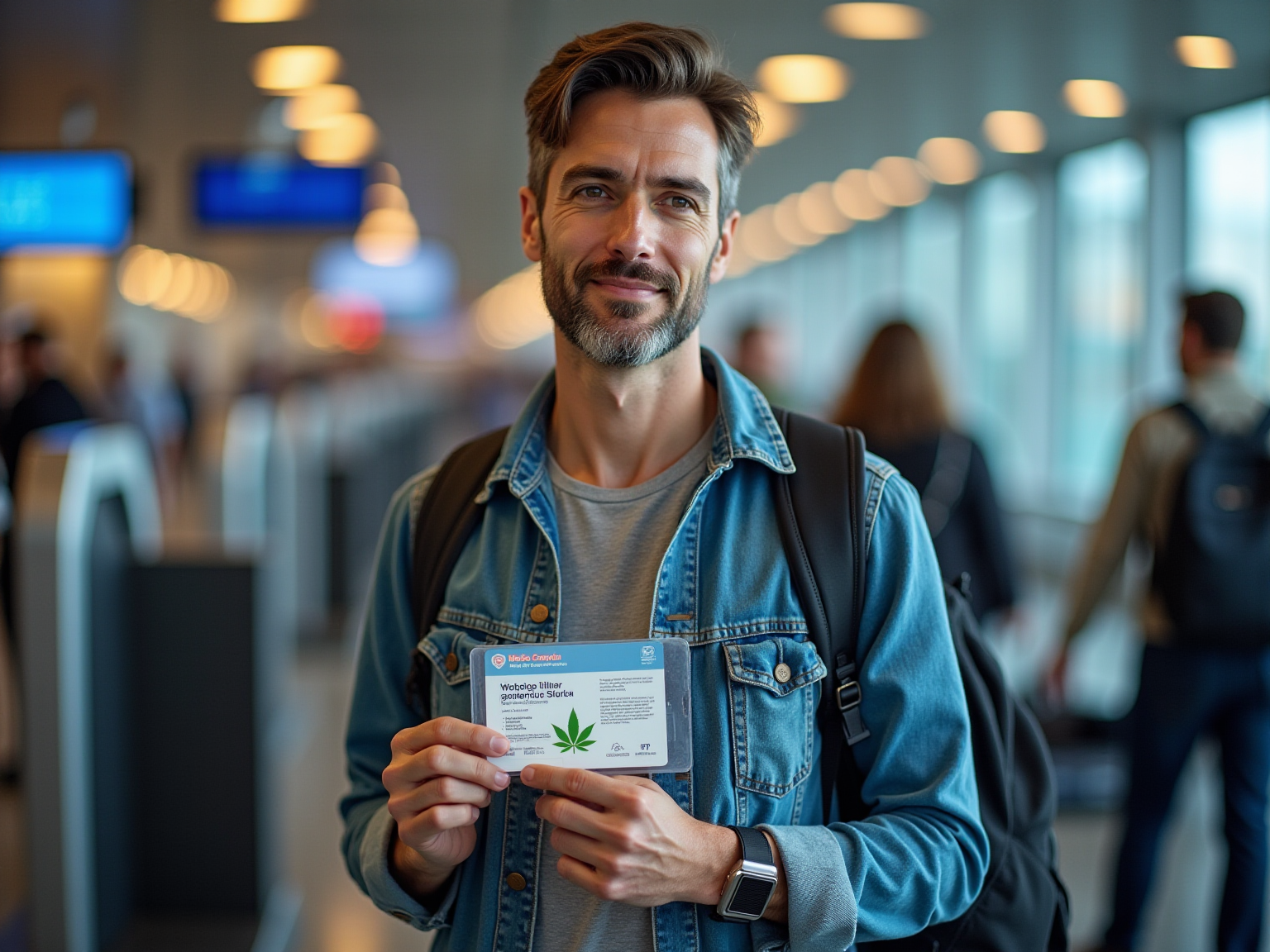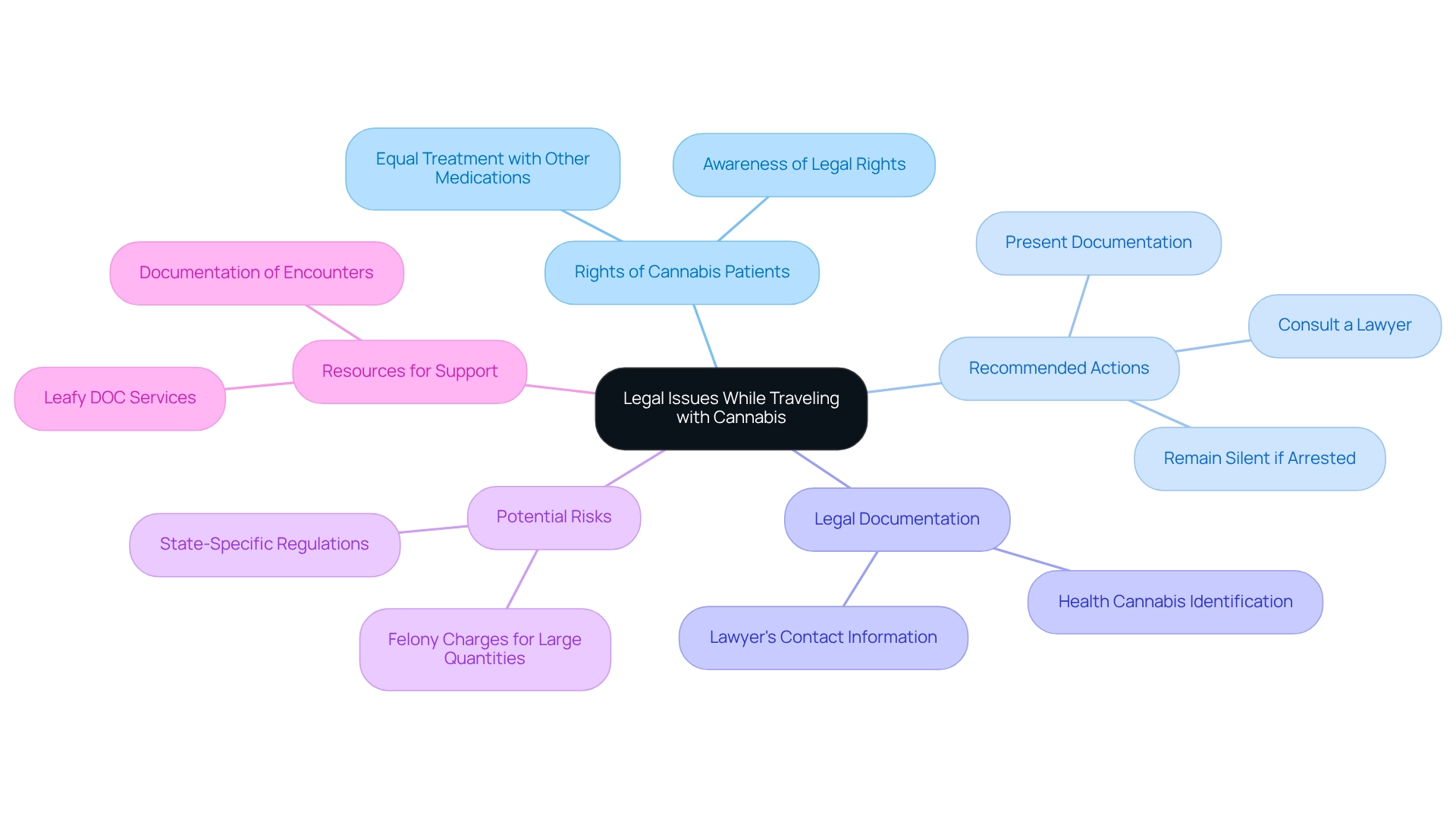How to Travel on a Plane with Medical Marijuana: A Step-by-Step Guide
by Maya Green · April 9, 2025
Learn if you can travel on a plane with medical marijuanas and understand the legal guidelines.

Overview
Traveling on a plane with medical marijuana can be quite challenging, especially given the complexities of federal laws that prohibit its transportation. This situation can be particularly stressful for those who rely on medical marijuana for their well-being. It’s important to remember that while many states have legalized its use, federal regulations still pose significant hurdles.
Understanding both federal and state regulations is crucial. Preparing the necessary documentation can help you navigate potential legal risks and ensure compliance during your travels. You may find that being proactive and informed can alleviate some of the worries associated with flying.
As you plan your journey, take the time to gather all relevant information and documentation. This preparation not only helps you feel more secure but also empowers you to advocate for your needs. Remember, you are not alone in this process; many others share similar concerns, and there are resources available to support you.
In conclusion, approach your travel with confidence and knowledge. By understanding the regulations and preparing accordingly, you can ensure a smoother experience while prioritizing your health and well-being.
Introduction
In today’s increasingly complex legal landscape, traveling with medical marijuana presents unique challenges for patients seeking relief. It’s important to acknowledge that while acceptance of medical cannabis has grown—40 states and Washington, D.C. now allow its use—federal law still classifies it as illegal. This reality complicates interstate travel, creating a sense of uncertainty for many.
This article delves into the intricacies of navigating state-specific regulations, TSA guidelines, and the potential risks associated with transporting medical marijuana. By understanding these legal nuances and preparing adequately, you can better ensure a safe and compliant journey. Together, we will explore best practices to help mitigate legal complications along the way, empowering you to travel with confidence.
Understanding the Legal Status of Medical Marijuana
When considering traveling with therapeutic cannabis, it’s essential to ask: can you travel on a plane with medical marijuana? This inquiry requires careful navigation of the intricate regulatory environment. While many regions have authorized therapeutic cannabis, it remains classified as unlawful under federal legislation. This means that possessing a valid cannabis card does not grant you the legal right to carry cannabis across state lines or onto an aircraft. Thus, the question arises: can you travel on a plane with medical marijuana?
As of 2025, 40 regions and Washington, D.C. have enacted laws allowing therapeutic cannabis use, following California’s pioneering example in 1996. However, specifics can vary widely from one jurisdiction to another, making it crucial to be informed.
Before embarking on your journey, it’s important to familiarize yourself with both federal regulations and the laws of the regions you will be traveling to and from. For instance, while California has permitted therapeutic cannabis since 1996, other regions may impose stricter regulations or may not recognize out-of-state therapeutic cannabis cards at all. Some areas accept out-of-state health cards, while others do not, so reviewing your local regulations for a complete list is vital.
Renewals for patient medical marijuana certifications also differ by region, typically occurring every one to three years. Patients dealing with chronic pain, PTSD, and other qualifying conditions should be particularly vigilant about these regulations.
Recent legislative efforts in areas such as Kansas have stalled, highlighting the ongoing challenges and frustrations lawmakers face regarding cannabis legalization. As Senator Jeff Yarbro noted, “Our region has spent millions and millions of taxpayer dollars to enforce outdated cannabis laws,” underscoring the need for reform.
Statistics reveal that the regulatory status of cannabis for health purposes is constantly evolving, with numerous regions reassessing their laws to align with shifting public views and health requirements. Starting in 2025, it’s essential to stay updated on the current regulatory position of cannabis in each region you plan to visit, along with any recent changes in national legislation that may impact your ability to travel with the substance.
Expert insights emphasize the importance of understanding the distinction between federal and local laws. While certain states have embraced medical marijuana, it raises the question: can you travel on a plane with medical marijuana? Federal law still prohibits its transportation, creating a potential regulatory minefield for travelers. Therefore, always verify the most recent information on cannabis regulations before your journey to ensure compliance and avoid complications.
Additionally, services like Leafy DOC offer quick approvals and extensive support, including telehealth options and educational resources, which can be invaluable for patients navigating these complex issues. The evolving legal landscape also impacts businesses in the cannabis industry, as seen with companies like Cover Cannabis, which specialize in tailored insurance solutions to help cannabis businesses manage risks amid changing regulations.
Preparing for Your Journey: Essential Tips for Traveling with Medical Marijuana
Preparing for your trip with cannabis can be a daunting task, especially when it comes to understanding whether you can travel on a plane with medical marijuana. It’s essential to pay careful attention to the details. Begin by gathering all necessary documentation, such as your cannabis card, a letter from your doctor, and any relevant prescriptions. This documentation is crucial, as it validates your need for cannabis and can help you avoid potential legal issues during your travels.
As highlighted by Leafy DOC, having a documented physician’s recommendation is vital for ensuring both compliance and safety.
Given that each region has different requirements regarding medical marijuana, it’s important to understand the regulations of the areas you will be traveling through. Some regions may require you to register after obtaining your certification from a doctor, while others may not. Once your region approves your registration, they typically email you a downloadable patient ID card, which you can either print or receive by mail.
This card is essential for accessing local dispensaries and purchasing medicinal cannabis products.
For those looking to obtain their therapeutic cannabis card, Leafy DOC offers efficient online telehealth services that simplify the process across all US states. This option can be particularly convenient for patients seeking quick access to their cannabis needs.
When preparing your cannabis, ensure it remains in its original packaging with labels intact. This not only aids in identifying the product but also demonstrates compliance with legal requirements. To further minimize detection, consider using smell-proof bags, which can help contain any odors that might draw attention.
Planning your travel route meticulously is also vital. Investigate the regulations of any regions you will pass through, as cannabis rules can vary greatly. Understanding whether you can travel on a plane with medical marijuana is crucial, as some areas may not recognize your healthcare cannabis card. Being aware of these variations can help you avoid issues during your journey.
For instance, in Florida, there is no affirmative obligation for hospitals to permit cannabis use, which is a significant consideration for patients traveling to or from that region.
While managing travel with medicinal cannabis can be feasible, it’s important to reflect on whether you can travel on a plane with medical marijuana and to avoid carrying it if possible. The risks associated with transporting cannabis, especially across state lines, often outweigh the benefits. As Jim L. Swart, Director of the Office of Drug and Alcohol Policy and Compliance, stated, “We want to assure the traveling public that our transportation system is the safest it can possibly be.”
By prioritizing preparation and compliance, you can ensure a smoother travel experience. Moreover, the ongoing demand for high-quality clinical trials to enhance understanding of cannabis use underscores the importance of staying informed about the evolving landscape of therapeutic cannabis. For the latest insights on medical cannabis regulations, be sure to check out Leafy Doc’s articles, which provide comprehensive guidance on what’s legal and what’s not.
Navigating TSA Regulations: What You Need to Know About Medical Marijuana
The Transportation Security Administration (TSA) does not actively search for cannabis during security screenings. However, if cannabis is discovered, TSA agents are required to report it to law enforcement. It’s important to remember that under federal law, cannabis remains illegal, which means transporting it on a plane is prohibited. For travelers carrying CBD products, it is crucial to ensure that these items contain less than 0.3% THC, as they may be permitted under certain conditions.
As we look ahead to 2025, TSA regulations continue to reflect this stance, emphasizing the importance of compliance with federal laws while navigating airport security. For those living with chronic pain, understanding the qualifying conditions for marijuana cards is vital to determine if you can travel on a plane with medical marijuana. Conditions like chronic pain, anxiety, and PTSD are widely recognized in many regions. However, it’s essential to note that rules differ significantly; some areas accept out-of-region health cards, while others do not.
You may find it helpful to check your regional page for a complete list of accepted conditions and card regulations. To acquire a cannabis prescription card, individuals typically must follow a region-specific procedure. This often involves obtaining a certification from a licensed doctor, registering with the authorities, and securing a patient identification card. Additionally, renewal procedures for medical cannabis certifications vary by region, typically occurring every one to three years. Being aware of these timelines can help ensure compliance with state laws.
Expert opinions suggest that while the TSA’s main focus is on security threats, the presence of cannabis can complicate the screening process. Travelers are encouraged to remain calm and prepared to clarify their circumstances, including providing any necessary paperwork, such as a cannabis card or a physician’s recommendation. As Joe Starr aptly puts it, “While it is hard to say bye to the bud, the best option is to just leave it at home.”
Statistics indicate that interactions between TSA agents and travelers possessing cannabis for health purposes are not uncommon, yet enforcement varies greatly by state and airport. Some airports have adopted more flexible policies that reflect local laws regarding cannabis possession. For instance, in Oregon, adults can legally purchase up to 5 grams of cannabinoid extracts or concentrates per day, which may influence how TSA regulations are applied in that area.
Case studies reveal that while TSA is obligated to report suspected violations, the actual enforcement of marijuana-related incidents is often limited. Many travelers have shared experiences of passing through security, raising the question of whether you can travel on a plane with medical marijuana without significant issues. This highlights the variability in TSA handling of such cases. It’s also essential to recognize that the proposed reclassification of cannabis faces a lengthy regulatory process, adding to the complexity of the landscape surrounding cannabis regulations.
Nevertheless, it is crucial for travelers to remain cautious and informed about the varying regional regulations concerning cannabis possession to prevent potential issues during their journey.
Risks and Consequences of Traveling with Medical Marijuana
When considering the journey of traveling with cannabis, it’s essential to ask: can you travel on a plane with medical marijuana? The considerable risks, such as the potential for arrest, confiscation of your medication, and various legal penalties, can be daunting. For instance, if you find yourself caught with cannabis at a TSA checkpoint, the repercussions can vary significantly based on local regulations. Some areas impose penalties or even criminal charges. In 2025, the arrest rate for cannabis possession at airports remains a pressing concern, with an average police presence of 278.473 officers per 100,000 residents, underscoring the likelihood of encountering law enforcement while traveling.
Recent statistics reveal a rising apprehension rate for cannabis possession at airports, emphasizing the importance of being well-informed about local laws and regulations. The regulatory framework surrounding cannabis is intricate and often changes across regions. Patients must understand that even in areas where cannabis use is allowed, federal regulations still classify it as a Schedule I substance, raising further questions about traveling with medical marijuana. Legal professionals strongly advise that if you face arrest for cannabis-related offenses, seeking legal counsel from a criminal defense attorney is crucial to navigate the potential consequences.
Moreover, when contemplating the dangers of traveling with medicinal cannabis, it’s vital to consider the real-life impacts, such as missed flights and travel disruptions due to detainment. Concerns have arisen around prescribing practices for cannabis, particularly regarding inadequate patient evaluations, which can complicate the experience for those traveling with their medication. Some doctors have faced criticism for not thoroughly assessing patients’ pain or health histories before issuing prescriptions, which can lead to challenges for patients on the go.
However, it’s important to recognize the transformative power of cannabis for many individuals. For example, veterans with PTSD, cancer patients undergoing chemotherapy, and those suffering from chronic pain have often reported significant improvements in their quality of life. A 2025 study indicated that veterans using cannabis experienced fewer PTSD symptoms and required fewer prescription drugs, while cancer patients noted reduced nausea and better pain management. This preference for cannabis over opioids stems from a desire for relief without the risk of addiction.
Expert opinions suggest that the health community does not universally endorse the heavy use of any substances, whether legal or illegal. Gerald J. McKenna, MD, points out that until further research is conducted, claims about cannabis’s efficacy for managing chronic pain, anxiety, post-traumatic stress disorder, depression, and various health issues remain largely anecdotal. This criticism surrounding the legalization of cannabis under the premise of medical necessity adds another layer of complexity for patients.
Given these challenges, it’s crucial for patients to weigh the necessity of bringing their medication against the potential risks, including the question of can you travel on a plane with medical marijuana. Exploring alternative options, such as obtaining cannabis at your destination where it is permitted, may offer a safer path. Ultimately, understanding the legal consequences of traveling with cannabis, along with awareness of the statistics on legal penalties, is vital for making informed decisions about your health and travel plans.
Furthermore, staying updated on the latest regulations regarding cannabis in your area can help you manage these complexities more effectively.
State-Specific Laws: What to Know Before You Fly
Navigating the regulations surrounding cannabis can feel overwhelming, especially when you’re wondering if you can travel on a plane with medical marijuana. It’s crucial to recognize that each region has its own set of regulations, which can differ significantly. Before embarking on your journey, take a moment to thoroughly investigate whether you can travel on a plane with medical marijuana in both your departure area and your destination.
For instance, while some regions may permit the possession of therapeutic cannabis, others might not recognize out-of-region therapeutic cannabis cards. This discrepancy can lead to potential legal complications, and we want to ensure you feel secure in your travels.
As of 2025, many areas continue to enforce strict regulations regarding traveling with medical marijuana. These restrictions can vary not only by region but also based on individual circumstances, such as whether you are a registered patient or a caregiver. Common qualifying conditions for obtaining a cannabis card include chronic pain, anxiety, arthritis, and PTSD.
In Virginia, for example, adults aged 21 and older can possess cannabis; however, the state does not recognize cannabis cards for therapeutic use from other states. Additionally, caregivers may be allowed to cultivate a limited number of plants for each patient. Understanding these nuances is essential for travelers to navigate their journeys smoothly.
Consider Colorado, where adult-use cannabis is legal, yet the health program is limited to residents. Visiting patients may find that they cannot access dispensaries, but they can purchase from adult-use outlets if they are 21 or older. It’s important to remember that public smoking is prohibited in many locations, and having your cannabis ID card can help you avoid unnecessary complications.
For those traveling from outside the region, grasping local regulations becomes vital, particularly regarding whether you can travel on a plane with medical marijuana. This knowledge is key to preventing any legal issues along the way.
Statistics indicate that many requests for cannabis cards are processed within 24-48 hours, which can be beneficial for those needing to secure their cards quickly before traveling. Rapid access to a cannabis card can significantly aid in your travel arrangements, ensuring compliance with local laws. To support this, the National Academies of Sciences, Engineering, and Medicine recommend that stronger federal leadership and a comprehensive research agenda can help mitigate public health risks associated with cannabis use.
To stay compliant with state laws, it’s essential for patients to remain informed about any recent legislative changes that could affect their travel plans. Consulting state-specific resources or professionals can provide valuable insights into the rules governing cannabis use while traveling. Remember, you’re not alone in this journey, and taking these steps can help ensure a smoother experience.
What to Do If You Encounter Legal Issues While Traveling
When facing challenges while traveling with cannabis, such as the question of whether you can travel on a plane with medical marijuana, it’s essential to remain calm and cooperative. If approached by law enforcement, kindly present your documentation, such as your health cannabis identification, and clearly explain your situation. Having a lawyer’s contact information readily available can be invaluable should you require legal assistance.
Understanding your rights as a cannabis patient is vital. In the United States, there are approximately 2 to 3 million registered cannabis patients. It’s important to recognize that there is insufficient evidence to justify treating these patients differently from those on other prescription medications. This awareness empowers you to assert your rights confidently when necessary.
Leafy DOC, a healthcare technology platform, is dedicated to improving access to cannabis and helping patients navigate regulatory challenges. By simplifying the process of obtaining a cannabis prescription through streamlined online telehealth services, Leafy DOC enhances the quality of life for patients, ensuring they are informed and prepared for any potential regulatory encounters. This patient-centered support is particularly significant, as many individuals prefer cannabis over traditional prescription medications due to its effectiveness and lower risk of addiction.
Documenting your encounter is also crucial. Make a note of the names and badge numbers of the officers involved, as this information could prove useful later. Real-life experiences illustrate that many patients have successfully overcome obstacles by being informed and prepared.
For instance, veterans have shared remarkable improvements in their PTSD symptoms after using cannabis, while cancer patients have reported reduced nausea and better pain management during treatment.
It’s important to note that possessing large quantities of cannabis may lead to felony charges for intent to sell or distribute, which can carry penalties of five or more years in federal prison and significant fines. As Denver District Attorney Mitch Morrissey has highlighted, there was a 9 percent increase in felony cases submitted to his office from 2008 to 2011, underscoring the serious implications of marijuana-related legal matters. Patients should be aware that while traveling, the question of whether you can travel on a plane with medical marijuana is crucial, as the status of medical marijuana can vary greatly from state to state. Understanding the specific regulations of the states you are traveling through is essential.
In the event of an arrest, it is advisable to remain silent until you can consult with a lawyer. This approach helps protect your rights and ensures you receive appropriate guidance. Experts emphasize the importance of understanding your rights while traveling, as this knowledge can significantly influence the outcomes of any issues you might face.
By being prepared and informed, you can navigate potential challenges related to traveling with therapeutic cannabis more effectively, ultimately enhancing the positive impact of such substances on your quality of life.
Best Practices for Safe and Legal Travel with Medical Marijuana
To ensure safe and legal travel with medical marijuana, it’s essential to adhere to the following best practices:
- Carry Documentation: Always have your cannabis card and any relevant paperwork readily available. This can help clarify your legal right to possess cannabis in various jurisdictions. It’s important to remember that each region has varying criteria for acquiring and utilizing a marijuana card, so make sure you adhere to your region’s regulations.
- Research State Laws: Before traveling, thoroughly research the cannabis laws of both your departure and destination states. For instance, while Oklahoma allows visiting patients to possess up to 3 ounces of cannabis flower, 1 ounce of cannabis concentrate, and 72 ounces of cannabis edibles, Massachusetts restricts its medical cannabis program to residents only. Understanding the laws surrounding medical marijuana is crucial, especially when considering if you can travel on a plane with medical marijuana to avoid legal issues.
- Proper Packaging: Pack your medication in its original packaging and consider using smell-proof bags to minimize detection. This is particularly important when traveling through airports, where security personnel may be vigilant.
- Consider Local Options: If feasible, avoid traveling with cannabis altogether. Instead, think about acquiring your medication at your destination, which can reduce the stress of carrying it across borders. Numerous dispensaries are present in regions where therapeutic cannabis is permitted, facilitating access to your treatment.
- Stay Informed on TSA Regulations: Familiarize yourself with whether you can travel on a plane with medical marijuana. While federal law prohibits cannabis on planes, it raises the question: can you travel on a plane with medical marijuana, given that some states have more lenient policies? Be prepared to explain your situation if questioned by security personnel.
- Know Your Rights: Understand your rights as a cannabis patient. If you face issues related to law, knowing how to respond can help safeguard you. For example, in Virginia, while out-of-state medical cards are not recognized, visitors can possess up to 1 ounce of cannabis with valid ID, but public smoking is prohibited. Additionally, as Sheldon Sommer notes, “Chances are you’ve encountered the ‘lazy stoner’ stereotype,” highlighting the importance of understanding legal rights and responsibilities while traveling.
- Public Use Awareness: Be aware that public smoking of cannabis is prohibited in many states, including Colorado, which emphasizes the importance of understanding local laws regarding cannabis use in public spaces.
By following these guidelines, you can minimize risks and ensure a smoother travel experience. Successful travel experiences from patients emphasize the significance of preparation and understanding of local regulations, reinforcing that informed travelers can navigate the complexities of traveling with cannabis effectively. Additionally, familiarize yourself with qualifying conditions for obtaining a medical marijuana card, such as chronic pain, anxiety, or PTSD, to ensure you meet the necessary criteria for your needs.
Conclusion
Navigating the complexities of traveling with medical marijuana can be challenging, but it is essential for patients seeking relief on the go. It’s important to remember that understanding the legal status of medical marijuana is crucial. Despite being permitted in many states, it remains classified as illegal under federal law. Each state has its own regulations, which can complicate interstate travel. Therefore, thorough research on state-specific laws and regulations is necessary to avoid potential legal pitfalls.
Preparation is key when embarking on your journey with medical marijuana. Carrying all essential documentation, such as your medical marijuana card and a physician’s letter, can help validate your medical needs and safeguard against legal issues. Additionally, you may find that understanding TSA regulations and the risks associated with traveling with cannabis can greatly reduce the likelihood of complications during your journey. It’s often advisable to explore local options for obtaining cannabis rather than transporting it across state lines, as this can alleviate the stress and risks involved.
The potential consequences of encountering legal issues while traveling with medical marijuana can be significant, including arrest or confiscation of medication. Being informed about your rights and remaining calm in challenging situations can make a substantial difference. Informed travelers who adhere to best practices can navigate these complexities more effectively, ensuring a safer and more compliant experience.
Ultimately, understanding the legal landscape, preparing adequately, and staying informed about regulations can empower you as a medical marijuana patient to travel with confidence. This will ensure that you can access the relief you need without unnecessary complications. Remember, you are not alone in this journey; many share your concerns and are navigating the same path.
Frequently Asked Questions
Can you travel on a plane with medical marijuana?
No, you cannot travel on a plane with medical marijuana due to federal laws prohibiting its transportation across state lines and onto aircraft, even if you possess a valid cannabis card.
What should I know about the legality of therapeutic cannabis in different regions?
As of 2025, 40 regions and Washington, D.C. have legalized therapeutic cannabis, but laws vary significantly between jurisdictions. It is crucial to understand the specific regulations of the regions you are traveling to and from.
What documentation do I need when traveling with cannabis?
You should gather necessary documentation, including your cannabis card, a letter from your doctor, and any relevant prescriptions, to validate your need for cannabis and help avoid legal issues during your travels.
How do I obtain a patient ID card for medical marijuana?
After obtaining your certification from a doctor, some regions may require you to register, which usually results in receiving a downloadable patient ID card via email or by mail.
What precautions should I take when preparing cannabis for travel?
Ensure that your cannabis remains in its original packaging with intact labels, and consider using smell-proof bags to minimize detection. Understanding the regulations of any regions you will pass through is also vital.
What are the risks of traveling with medical marijuana?
The risks associated with transporting cannabis, especially across state lines, often outweigh the benefits, and it is advisable to avoid carrying it if possible.
How can I stay updated on cannabis regulations while traveling?
It is important to stay informed about the evolving legal landscape of therapeutic cannabis by checking resources like Leafy DOC for the latest insights on medical cannabis regulations in the regions you plan to visit.
Last Updated: July 10, 2025
Get Approved for Your Medical Marijuana Card in Minutes!

Get Your Medical Card
Connect with a licensed physician online in minutes

Like This Article?
Share with your friends
Table of Contents
Keep Reading
-
Renewing Your Medical Marijuana Card: What You Need To Know
Stay legal and access your essential medications with ease by learning how to renew your medical marijuana card. Click now to discover the crucial information you need for a smooth renewal process.
-
Managing Chronic Pain with Medical Marijuana
Discover how medical marijuana can help manage chronic pain and reduce your reliance on opioids. Learn about the benefits and risks of using cannabis for pain relief.
-
Mastering Cannabis Inhalation Techniques: A Comprehensive Guide
Discover the ultimate guide to mastering cannabis inhalation techniques and elevate your experience like never before! Learn the secrets to enhancing your cannabis sessions with our comprehensive guide. Start perfecting your inhalation technique today!





